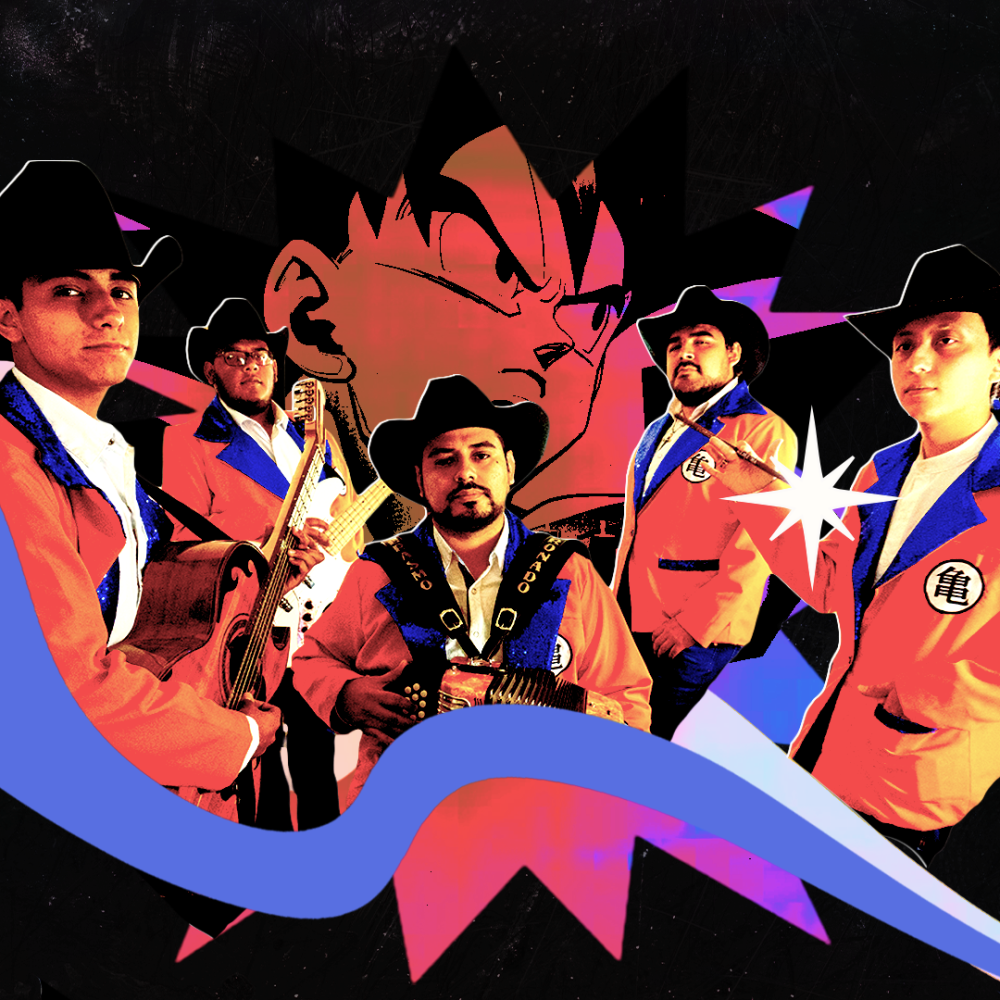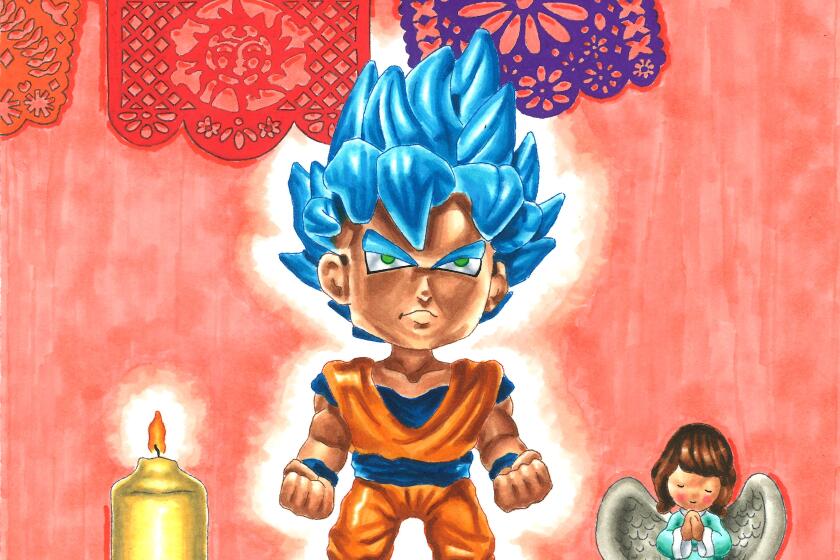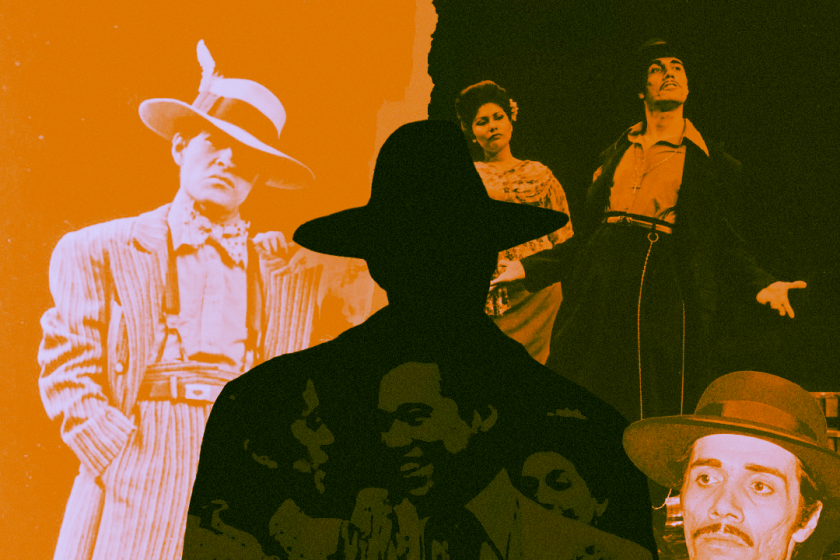
- Share via
News of Akira Toriyama’s death rang across the internet earlier this month, leaving millions of anime fans mourning the loss of the influential manga artist behind the “Dragon Ball” series.
Many of them could be found across Latin America — Mexico in particular— and among Latinos in the U.S., who have embraced the animated series and adopted its spiky-haired protagonist, Goku, as one of their own, joining the ranks of Rocio Dúrcal, the Xenomorph from “Alien” and Carmex lip balm as foreign-born entities given spiritual Mexican citizenship. Drive through pretty much anywhere in Mexico and you’ll find Goku emblazoned on all manner of vehicle, food carts and merch.
Legendary manga artist Akira Toriyama died Friday. Among his work was the ‘Dragon Ball’ series, which has found mass success with Latino and Latin American audiences.
Yair Guzmán recalls being 8 years old and watching anime on the family’s TV when his dad came into the room and asked, “¿Estás viendo Goku?”
“A really beautiful memory I have of my dad was watching ‘Dragon Ball’ together,” said Guzmán, who spoke to me from his home in Monterrey, Nuevo León. He was surprised to find out that his dad had fallen in love with the anime franchise in the ‘90s — while “Dragon Ball” originally aired in Japan in the late 1980s, the Spanish-dubbed version premiered on Mexico’s Canal 5 in 1996, with “Dragon Ball Z” popping onto screens soon after.
That moment deeply impacted Guzmán, who, now at 26, transforms into his stage persona Lalothing and leads Los Shinigamis del Norte, a música Mexicana regional group that performs anime-centric songs and covers in Spanish, dabbling in cumbia, rock and other genres. Dressed in matching Norteño-style suits that emulate Goku’s orange and blue Turtle School uniform, the band rip through recognizable (to anime heads) jams like “El Poder Nuestro Es” (a “Dragon Ball Z” opening song) and “Pegasus Fantasy” (from “Saint Seiya”) at conventions, events and anywhere else cosplayers are in full reventón mode.

“I’ve been doing anime parodies in Norteño style for a few years,” said Guzmán, who started Los Shinigamis del Norte in 2017. “Then one day I said, ‘I want to take it to the next level.’ When I get invited to conventions I’m not just gonna have the one song. I’m gonna have a full Norteño band with me.”
He assembled a banda: Erasmo Herrera on accordion, Fernando Dominguez on bajo quinta, drummer Diego Garcia and bassist Marcos Bocanegra.
“We’re real musicians that are serious about the music, the performance, about everything sounding good,” said Guzmán. “We don’t do it as a joke or a way to mock. We do it to put on a good show.”
A video of Vietnamese men dressed in pachuco style has gone viral on social media, sparking conversations about appropriation and who gets to partake in the culture.
Los Shinigamis del Norte went viral in 2022 when videos of their performance at an anime convention in Monterrey started making the rounds. In them, the group is playing “Mariposa,” a cover of “Butterfly” from “Digimon,” while fans dressed as characters from sci-fi and anime, including a Mandalorian with a Grogu doll, dance.
Guzmán says it was only their third or so performance, but it was enough to garner affectionate support from all over the world. Since then, the band has landed more gigs and have built up an audience on Spotify and YouTube. He credits their success to the audience who attend their live shows.
“They’re listening to us play, they start dancing and it occurs to one of them to take video,” he says. “There’s a saying that goes ‘mi México mágico,’ which has to do with surrealist things that happen here, and I feel like we’re part of that.”
In combining his passion for anime with his Mexican roots, Guzmán helped create the genre Nortaku, a portmanteau of the Japanese term “otaku” with “norte.” It exemplifies a beautiful collision of cultures that brings a smile and sense of awe in a world that feels big and scary. Here are a group of young Mexican dudes showing their love and appreciation for a Japanese art form in a way that feels true to them, and in doing so creating a new culture and a joyous space that honors both.
“We really enjoy the fandom, and the appreciation for other cultures,” added Guzmán. “And the fact that we try to Mexicanize it, I feel, is another way to tell the creators that we love them.”
Since Los Shinigamis del Norte’s rise, more music groups have started to pop up covering anime and cartoon songs. Cosplayers, too, have begun incorporating cowboy hats and other elements of Norteño fashion into their costumes. Guzmán couldn’t be happier: “It’s cool to see more creators joining the movement… We do feel like the pioneers of something that became huge.”
Guzmán compares Toriyama’s popularity in Mexico to that of “El Chavo del Ocho” in Brazil, where the Mexican comedy series is dubbed in Portuguese and is often the number one daytime program in the country. With Toriyama’s death, more people have discovered the group as posts from around Latin America showing their love of the artist and his many contributions to culture have been shared. Los Shinigamis del Norte posted a music video honoring Toriyama, captioning it “Esta va por mi infancia” accompanied by a cheers emoji.
“A lot of friends of mine were really saddened by the news,” said Gúzman. “I was doing a livestream when I found out Toriyama passed and we started remembering his songs, and it kinda just fills you with nostalgia because of what it all meant to our childhoods. Mine as much as so many other Mexicans and Latinos. He was so aspirational.”
He fondly recalled wanting to transform into a super Saiyan and doing the Kamehameha in the hopes that “a little bolt might shoot out.” While no actual bolts may have ever left his hands, Guzmán and Los Shinigamis del Norte have still managed to fill the world with explosive energy.
Alex Zaragoza is a television writer and journalist covering culture and identity. Her work has appeared in Vice, NPR, O Magazine and Rolling Stone. She’s written on the series “Primo” and “Lopez v. Lopez.” She writes regularly for De Los.
More to Read
The Latinx experience chronicled
Get the Latinx Files newsletter for stories that capture the multitudes within our communities.
You may occasionally receive promotional content from the Los Angeles Times.








